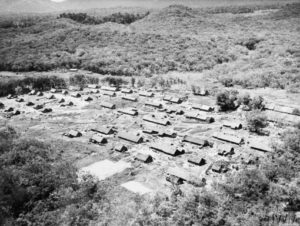Development and Securitisation, and (Counter)-Insurgency Joint research workshop:
Understanding Insurgencies network and The worlds of (under)development: processes and legacies of the Portuguese colonial empire in a comparative perspective (1945-1975)
Lisbon, Portugal, 14-15 March 2019
Call for Papers
Proposals for papers are invited from members of the Understanding Insurgencies network and others for a two-day research workshop exploring the connections between development initiatives and counter-insurgent efforts to restore, impose, or otherwise establish forms of social control.

THE MALAYAN EMERGENCY 1948-1960 © IWM (K 14435)
Enmeshed in rhetoric of poverty reduction and enhanced social opportunity, colonial development is increasingly viewed by scholars more sceptically: less as evidence of imperial goodwill than as an instrument of social and geo-political control in the face of mounting anti-colonial opposition. Sometimes described as integral to colonial claims to modernization, development policies could be highly coercive. At one level, technical aid and financial support was expected to diminish the appeal of anti-colonial alternatives, thereby stabilizing imperial order. At another, more tangible level, the instruments of development were often directives requiring forced relocation, the abandonment of customary practices, or the fulfillment of obligations that rendered individuals legible to – and controllable by – colonial authority. Arguments over development thus encapsulated the tension intrinsic to colonial authority: limited interventionism and purported respect for local ‘tradition’ or the pursuit of heightened social control characteristic of development projects.
Development was also implicit in early humanitarian projects and the internationalization of public health. Transnational networks of philanthropists, charity sector humanitarians, and healthcare practitioners frequently intersected in colonial territories, where impulses to intervene, to administer, and to mobilize labour might all be codified as facets of imperialistic development. Imposed on predominantly rural societies variously depicted as archaic or in crisis, development posited technocratic initiatives, infrastructure projects, and welfare projects as routes to modernity.  These efforts were assisted and accelerated by new technologies, from vaccines and insecticides, to agro-chemicals, and cheaper building materials. All facilitated the expansion of colonial primary healthcare, large-scale agriculture, and so-called ‘model’ villages. Of a piece with early and mid-twentieth century practices of humanitarian relief, colonial development might be conceptualized in terms of recovery and transformation. But in its intentions as much as its methods, colonial development was also authoritarian, a means to render subject populations more legible and easily administered. For Salazarist Portugal for instance, “modernizing” and “progressive” techniques of socio-economic intervention became fundamental to the regime’s efforts to legitimize its colonialism.
These efforts were assisted and accelerated by new technologies, from vaccines and insecticides, to agro-chemicals, and cheaper building materials. All facilitated the expansion of colonial primary healthcare, large-scale agriculture, and so-called ‘model’ villages. Of a piece with early and mid-twentieth century practices of humanitarian relief, colonial development might be conceptualized in terms of recovery and transformation. But in its intentions as much as its methods, colonial development was also authoritarian, a means to render subject populations more legible and easily administered. For Salazarist Portugal for instance, “modernizing” and “progressive” techniques of socio-economic intervention became fundamental to the regime’s efforts to legitimize its colonialism.
It is these coercive aspects of colonial development, as well as their intersections with specific late colonial insurgencies and counter-insurgent efforts, that this workshop will explore.
Papers are therefore invited that engage with development, both as a colonial practice and as an instrument of counter-insurgency in conflicts of decolonization. Proposals that make connections between development initiatives and late colonial counter-insurgency campaigns are particularly welcome. The organisers will also be happy to consider proposals discussing the underlying precepts of development thinking, including its presumptions about gender, psychology, and local cultures. Papers that address the role played by social scientists in development projects might be especially relevant. Ideas shared and networks built between counter-insurgency practitioners and development experts may also be explored. Other topics, including the connections between development and forced population removal, between development and surveillance, or between development and the transformation of the local environment would be equally welcome. The workshop also plans to address local responses to development projects and Third Worldist criticisms of development, whether as an imperialistic device or as a ‘right’ for all rather than as a rich world ‘gift’. Papers offering local and anti-colonial perspectives on late colonial development will thus be of particular interest.
Practical details
If you’d like to submit a proposal, please email a title and brief abstract of 300 to 500 words to the organisers: Martin Thomas, Gareth Curless, and Miguel Bandeira Jerónimo by Friday 1 February 2019.
Martin.c.thomas@exeter.ac.uk, g.m.curless@exeter.ac.uk, mbjeronimo@gmail.com
The workshop will be hosted by the Centre of Social Studies at the University of Coimbra and is linked to a collaborative research project led by Miguel Jéronimo Bandeira, The worlds of (under)development: processes and legacies of the Portuguese colonial empire in a comparative perspective (1945-1975)
It also forms part of the Understanding Insurgencies: Resonances from the Colonial Past research network funded by the Leverhulme Trust and led by Martin Thomas and Gareth Curless of the University of Exeter. The organisers are able to cover speakers’ travel and two nights’ accommodation costs for attendance at the workshop, but request that anyone travelling long distances make effort to secure cheap flights.
Comments are closed, but trackbacks and pingbacks are open.